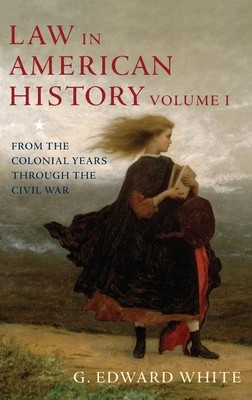
- We will send in 10–14 business days.
- Author: G Edward White
- Publisher: Oxford University Press, USA
- Year: 2012
- Pages: 584
- ISBN-10: 0195102479
- ISBN-13: 9780195102475
- Format: 16 x 23.4 x 4.8 cm, kieti viršeliai
- Language: English
- SAVE -10% with code: EXTRA
Reviews
Description
In the first of the three volumes of his projected comprehensive narrative history of the role of law in America from the colonial years through the twentieth century, G. Edward White takes up the central themes of American legal history from the earliest European settlements through the Civil War.
Included in the coverage of this volume are the interactions between European and Amerindian legal systems in the years of colonial settlement; the crucial role of Anglo-American theories of sovereignty and imperial governance in facilitating the separation of the American colonies from the British Empire in the late eighteenth century; the American "experiment" with federated republican constitutionalism in the founding period; the major importance of agricultural householding, in the form of slave plantations as well as farms featuring wage labor, in helping to shape the development of American law in the eighteenth and nineteenth centuries; the emergence of the Supreme Court of the United States as an authoritative force in American law and politics in the early nineteenth century; the interactions between law, westward expansion, and transformative developments in transportation and communiciation in the antebellum years; the contributions of American legal institutions to thedissolution of the Union of American states in the three decades after 1830; and the often-overlooked legal history of the Confederacy and Union governments during the Civil War. White incorporates recent scholarship in anthropology, ethnography, and economic, political, intellectual and legal history to produce a narrative that is both revisionist and accessible, taking up the familiar topics of race, gender, slavery, and the treatment of native Americans from fresh perspectives. Along the way he provides a compelling case for why law can be seen as the key to understanding the development of American life as we know it. Law in American History, Volume 1 will be an essential text for both students of law and general readers.
EXTRA 10 % discount with code: EXTRA
The promotion ends in 21d.23:51:20
The discount code is valid when purchasing from 10 €. Discounts do not stack.
- Author: G Edward White
- Publisher: Oxford University Press, USA
- Year: 2012
- Pages: 584
- ISBN-10: 0195102479
- ISBN-13: 9780195102475
- Format: 16 x 23.4 x 4.8 cm, kieti viršeliai
- Language: English English
In the first of the three volumes of his projected comprehensive narrative history of the role of law in America from the colonial years through the twentieth century, G. Edward White takes up the central themes of American legal history from the earliest European settlements through the Civil War.
Included in the coverage of this volume are the interactions between European and Amerindian legal systems in the years of colonial settlement; the crucial role of Anglo-American theories of sovereignty and imperial governance in facilitating the separation of the American colonies from the British Empire in the late eighteenth century; the American "experiment" with federated republican constitutionalism in the founding period; the major importance of agricultural householding, in the form of slave plantations as well as farms featuring wage labor, in helping to shape the development of American law in the eighteenth and nineteenth centuries; the emergence of the Supreme Court of the United States as an authoritative force in American law and politics in the early nineteenth century; the interactions between law, westward expansion, and transformative developments in transportation and communiciation in the antebellum years; the contributions of American legal institutions to thedissolution of the Union of American states in the three decades after 1830; and the often-overlooked legal history of the Confederacy and Union governments during the Civil War. White incorporates recent scholarship in anthropology, ethnography, and economic, political, intellectual and legal history to produce a narrative that is both revisionist and accessible, taking up the familiar topics of race, gender, slavery, and the treatment of native Americans from fresh perspectives. Along the way he provides a compelling case for why law can be seen as the key to understanding the development of American life as we know it. Law in American History, Volume 1 will be an essential text for both students of law and general readers.


Reviews